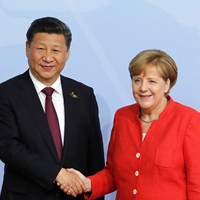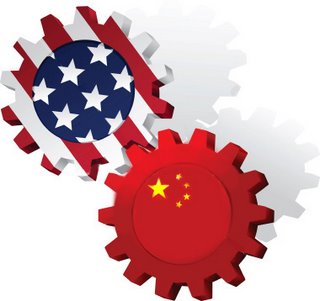- 当前位置:
- 首页>
- 活动>
- ���������������
���������������
CCG持续关注国际关系议题,推动中国与全球化的发展,积极开展国际交流,充分发挥智库“二轨外交”作用,在巴黎和平论坛、达沃斯世界经济论坛、慕尼黑安全会议等重要国际政策与意见交流平台上组织分论坛、边会、圆桌会议、晚宴等活动,促进国际政商学界对话,凝聚共识;CCG积极与各国政界、智库界、工商界开展“二轨外交”活动,每年常态化赴多国调研与交流,促进中外关系攸关方互动,保持与多国政策圈层的沟通渠道。
-

[SPUTNIK] China, Germany to Harmonize Positions at G20
China and Germany, countries which are called beneficiaries of globalization by experts, could find common ground at the upcoming G20 Summit in Hamburg.China and Germany, both main beneficiaries of globalization, are likely to find common ground at the upcoming G20 Summit in Hamburg despite massive anti-globalization protesters flooding the streets of the German port city, experts told Sputnik on Friday.BALANCED GROWTHDemonstrators fighting for a wide range of causes occupied the streets of Hamburg in recent days, in anticipation of the annual gathering of leaders from 20 major economies of the world, taking place on July 7-8.Activists called on local residents to take part in a demonstration dubbed "Welcome to Hell," organized by an anti-capitalist group and aiming to express protest and resistance against leaders of capitalist regimes all over the world.Another group launched a protest with an artistic touch, titled "1000 Gestalten," where 1,000 zombie-like creatures covered in crusty clay flocked through the streets of Hamburg on Wednesday. The demonstration, in the form of an art performance, was a symbol for a solitary and open-minded civil society, organizers said.Local law enforcement officials said about 20,000 police officers would be deployed during the G20 meeting to ensure security in the city.Unlike the last time when the summit took place in the city of Hangzhou in eastern China, where local authorities made sure no sign of opposition would occur, Hamburg is expected to offer a completely different environment for world leaders.Despite foreseeable chaotic scenes in the streets and vocal opposition from different groups, China, which chaired the summit last year, is expected to find a lot of common ground with the host Germany, as both nations are main beneficiaries of globalization thanks to their strongholds in the global manufacturing chain, experts told Sputnik."Both China and Germany have strong manufacturing industries and benefited greatly through the globalized economy. They should have a lot of common language in promoting the continuation of globalization," Wang Huiyao, the president of Center for China and Globalization (CCG)in Beijing, told Sputnik, adding that German Chancellor Angela Merkel may feel she has got a helping hand from Chinese President Xi Jinping after US President Donald Trump made things awkward during the G7 Summit in Italy earlier this year.Official figures showed Germany’s trade surplus reached a new record of $270 billion in 2016, while China’s trade surplus stayed strong at $511 billion last year, despite a 7.7 percent drop in exports from the previous year.However, the Beijing-based expert acknowledged that there was some negative impact from globalization, especially on specific industries in certain countries, and it is important for global leaders to address those issues while pushing forward the process of globalization."We do need to reflect on the negative impact of globalization and promote balanced growth globally to make sure the benefits reach ordinary people in different countries," he said.Trump has long accused China of stealing manufacturing jobs from the United States and promised to bring those jobs back to the country during last year’s presidential campaign.Merkel told German magazine Die Zeit earlier this week that, while Germany is looking at the possibilities of cooperation to benefit everyone, globalization is seen by the US administration more as a process that is not about a win-win situation but about winners and losers.As nations including China, Germany and the United States improve their economic structure through the globalization process, it is possible for certain kinds of manufacturing to return to advanced economies, Wang suggested."Chinese auto glass manufacturer Fuyao Glass decided to move its manufacturing to Ohio in the US to reduce cost, by bringing production closer to its customers in North America," he said.In October 2016, Chairman of Fuyao Glass Cho Tak Wong pledged to invest $500 million into an automotive glass plant in Ohio, which employs about 2000 workers.Wang also sees an opportunity for Chinese companies with rich experience in infrastructure construction to be involved in similar projects in the United States after Trump promised to "make America great again" by improving the country’s aging infrastructure.PAINFUL TRANSITIONAmericans voters in states such as Michigan, Ohio and Pennsylvania, where manufacturing used to dominate the local economy, broke away from their tradition to support the Democratic Party and voted for Trump during last year’s US presidential election.After taking office, Trump threatened to wage a trade war against China and Germany by introducing stiff tariffs as part of his efforts to push US companies to move manufacturing jobs back to the country.But economists said it would be impossible for Trump to succeed in bringing those jobs back to as it is against the rule of the market economy."There’s no way for Trump, even if he would use the most severe trade policies, to bring American manufacturing jobs back to an appreciable extent," Alan Deardorff, the professor of international economics and public policy at the University of Michigan, told Sputnik.US automaker Ford Motor said in late June that it plans to centralize production of the next generation of its iconic compact car, the New Ford Focus, in China, instead of Michigan or Mexico. Ford currently builds its Focus compact cars in Michigan, as well as in China and Europe.The US economist pointed out that technology improvements such as automation and robots was also a factor that led to a loss of manufacturing jobs in the United States, in addition to losing those jobs to countries like China.Traditional manufacturing hubs in the United States, such as Detroit in Michigan or Pittsburgh in Pennsylvania, need to go through a painful transitional period to upgrade local industrial structures to move away from manufacturing, Deardorff suggested."The Detroit area suffered tremendously because of the decline of the auto industry," he said, adding that local population dropped by more than half.The economic professor noted that Pittsburgh, which used to be the US center for steel production half a century ago, was a successful example of this kind of industrial transition."They (Pittsburgh) went through a terrible time, but they have come back, by shifting to healthcare and education. Major hospitals and universities helped the city thrive again," Deardorff said.NO ALTERNATIVEGermany police clashed with thousands of protesters taking part in the "Welcome to Hell" demonstration near the summit venue on Thursday. Local authorities said dozens of police officers were injured during violent clashes throughout the evening. Local police expected about 100,000 protesters to march in the streets of Hamburg during the 2-day summit.The organizers of the demonstration are a group of anti-capitalist activists who blame the capitalist economic model for global exploitation and impoverishment. The group claimed "the apparently unchallenged triumph of capitalism has left behind a trail of devastation."Ironically, one of the key participants of the G20 summit and a main beneficiary of globalized capitalist economy is China, which still labels itself as a Socialist country.Economists suggested that, despite flaws in the capitalist economic system, there is no viable alternative that has been proven to be successful."The alternative has been tried in the Soviet Union and in China before Deng Xiaoping. It didn’t really deliver the goods," Tony Makin, the professor of economics and director of the Griffith APEC Study Center at Griffith University in Australia, told Sputnik, adding that China is the best example where the leaders realized that a market economy delivers growth.The Australian economist believes that globalization should not be reversed, but instead, local authorities need to figure out ways to compensate those vocal minority losers in the globalized economy.From SPUTNIK,2017-7-7
2017年7月12日 -

[Bloomberg News] With 100-Day Sweetener Talks
For China, the most important achievement of the 100 days of trade talks with the U.S. now coming to a close might be keeping its counterpart at the table.Negotiations due to end on July 16 have yielded some progress already, such as getting American beef back in Chinese stores, a small step toward addressing the $347 billion U.S. deficit on $578.6 billion in trade last year.But even amid continued engagement, major breakthroughs look less likely with President Xi Jinping complaining of a “negative” turn in relations just before his expected meeting with Donald Trump this week, and escalating tension over North Korea that the U.S. links to trade.For the world’s second-largest economy, the talks are a goodwill gesture to maintain friendly economic ties and avoid White House ire, said Wang Youxin, an analyst at Bank of China’s Institute of International Finance in Beijing. "We make some concessions, give them a sweetener," he said.The lifting of China’s 14-year ban on U.S. beef imports is one of the initial deals, dubbed "early harvests," that allow both sides to say they’re making progress. Related benefits include a surge in U.S. crude oil imports since April and an increase in the purchase of American liquid natural gas.In addition, China has approved two out of eight biotechnology product applications from the U.S., and the central bank said this week it will allow foreign-owned financial services firms to compile and issue credit ratings in the domestic bond market."The talks show China understands U.S. concerns -- we’re paying attention, we’re willing to cooperate, and we’re determined to produce deliverables," said Wei Jianguo, a former vice commerce minister and now vice chairman of the China Center for International Economic Exchanges, a Beijing-based think tank. The negotiation style fits Trump’s temperament and can help send positive messages, he said.Still, that dialog is being interrupted by the standoff between the U.S. and North Korea over the latter’s nuclear program. After Pyongyang’s testing of a intercontinental ballistic missile this week, Trump has linked his frustration over the regime to his willingness to compromise on trade with China.“Trade between China and North Korea grew almost 40% in the first quarter. So much for China working with us - but we had to give it a try!” Trump said Wednesday on Twitter.Ministry of Commerce data show trade with North Korea rose 13.7 percent in the first five months from a year earlier. Exports rose 32 percent while imports contracted 9.3 percent.‘Good Start’"Trump and China have had a good start, but now it’s hit a bump on the North Korea issue," said Wang Huiyao, director of Beijing-based think tank China Center For Globalization(CCG). "There are opportunities for China and the U.S. to sit down and talk to find a way out as the 100-day trade talks are still ongoing, Xi and Trump are set to meet at G-20, and Trump is going to visit China this year. China-U.S. trade is the basis of bilateral relations and none can afford a trade war. The world can’t either.""China’s economic relations with the U.S. are always not just about the economic issues, and there are always other interests involved. The recent North Korea provocations could possibly exert some negative impact, as Trump may get impatient and anxious and start to pressure China," Song Hong, a senior fellow at the Chinese Academy of Social Sciences, which advises the government on policy.Positive SignThe 100-day talks are making good progress, according to Zhu Guangyao, China’s vice finance minister. The two nations have contacts "every morning and every evening," Zhu said at a press conference at the G-20 meeting in Hamburg on Thursday. China has also studied Trump’s books on how to do deals, Zhu, who is also a lead negotiator in the trade talks, said.Some Chinese analysts share the view that what truly matters about the 100-day talks is keeping both sides together at the negotiation table and avoiding a trade war, according to Lu Zhengwei, chief economist at Industrial Bank Co. in Shanghai.Agriculture and energy are the trade domains most likely to show additional progress, according to Lester Ross, a partner in the Beijing office of U.S. law firm WilmerHale who also leads the policy committee of the American Chamber of Commerce in China.China’s commerce ministry said in a May report that it wants to increase U.S. agricultural imports such as soybeans and cotton, along with energy products including liquid natural gas, crude oil and refined oil, plus aircraft, integrated circuits and machine tools.Such gains are less impressive in a broader context of the world’s largest trading nation: China’s customs data show total beef imports stood at $2.5 billion in 2016, while crude purchases totaled $116.5 billion -- and machinery imports came in at $771.4 billion. Allowing foreign credit rating firms to compete in the domestic market was a long-awaited step that’s part of a broader reform plan to open up the financial system.Asymmetric AccessThe trade plan could erode some of China’s trade surplus with the U.S., and to a larger extent if the imports boost expands to more sectors, said Wang. But the bigger challenge in the negotiations will be to persuade China to further open service sectors including education, finance and health care, he said.Ross said American businesses are more worried about asymmetric market access, in which they’re blocked from operating or acquiring in large swathes of the economy while Chinese companies are mostly unencumbered in the U.S. Bigger Chinese commitments are needed to lower barriers for the U.S. firms, he said, calling the new foreign investment guidelines "limited progress" toward leveling the playing field."The 100-day trade plan could very well be a trap for the U.S.," said James McGregor, China chairman of business advisory firm Apco Worldwide Inc. and a former AmCham chairman. "After a few concessions on each side, then China may consider that things are back to business as usual with the various industrial and technology policies that are very threatening to the future of the U.S. businesses."In the lead-up to Xi meeting Trump on the sidelines of the G-20 summit in Hamburg, old disputes are resurfacing and cooling the warmth that followed their Florida summit. The U.S. has in recent days made a naval patrol past a Chinese-controlled islet, announced an arms sale to Taiwan, ranked China among major human-trafficking offenders, and called on Beijing to let ailing Noble Peace Prize winner Liu Xiaobo seek cancer treatment abroad.“Ties are also affected by some negative elements, and the Chinese side has already expressed our stance to the U.S.,” Xi told Trump, state television reported Monday.Those issues aside, economic relations are still a long way from the worst-case scenario. Trump, elected last year after more than two decades of criticizing China’s trade policy and a campaign full of promises to fight it, has eased off threats since meeting Xi at Mar-a-Lago."Reversals in Trump’s attitude are like a negotiation tactic, or bluff, to get a better deal," said Lu. China and the U.S. may "draw their swords," he said, but won’t really fight.From Bloomberg News,2017-7-6
2017年7月12日 -

【Global Times】Wang Huiyao: G20 summit stresses unity and inclusiveness
On July 7 and 8, the 12th G20 summit took place in Hamburg, where governments from 20 major economies gathered. The delicate diplomatic waltz didn’t hide the stormy discord between world leaders. Host Chancellor Angela Merkel had previously slammed President Donald Trump’s withdrawal of the US from the Paris Agreement. UK Prime Minister Theresa May continuously looked for allies in the face of Brexit. The relationships between China, the US and Europe have become increasingly unpredictable, and the 12th G20 summit was doubtlessly a collision between globalization and anti-globalization.The year 2016 marked the start of an anti-globalization era. The UK voted for Brexit, the election of Trump boosted global populist movements, Prime Minister Matteo Renzi resigned after a constitutional referendum defeat, and Europe struggled to accommodate millions of asylum seekers. Backlash against globalization loomed, facilitating a steep anti-globalization boom. However, amid the stormy waves of globalization and anti-globalization projected by many politicians across the Western world, the relations between China, the US and Europe experienced positive signs. Chancellor Merkel dined with President Xi Jinping in prelude to the G20 summit, strengthening a stable and prosperous China-Germany relationship. The two leaders pledged to work more closely on a host of issues, with Chancellor Merkel supporting globalization. The common ground between China and Germany, on issues such as climate change and reciprocal trade agreements, guarantees an increasingly strategic and united relationship.Europe needs close engagement with China on the global management of climate change and the preservation of an open trading system, while the US needs China to deal with North Korea. This multi-polar relationship puts China at the very heart of the international system, with an essential role in framing the international agenda while assuming new responsibilities. With an intertwined destiny, China, the US, and Europe should balance competition with partnership, maintaining close dialogue and acting more in concert. Looking through history, 70 years after WWII, a global war hasn’t broken out again. This relative peacefulness is largely due to globalization. A variety of economic, cultural, and social bonds around the globe ensure a collaborative and harmonious era. In the US, there are approximately five million overseas Chinese. For foreign companies, the emerging market environment in China is highly lucrative. In this context, exchanges in the economic sector mitigate the potential challenges projected by the geopolitical sector. For China and the US, an economic and cultural relationship manifests the common aims of mankind, preventing geopolitical and military conflicts. This is also the core value of globalization: the more open a country can be, the more peaceful it becomes.For China, the 12th G20 summit was a venue to tackle the rise of anti-globalization while championing globalization. The theme of the 12th G20 was "Shaping an Interconnected World," which dovetails with the ideals of the previous G20 summit in Hangzhou to promote an innovative, dynamic and inclusive world economy. During the 12th G20 summit, China has successfully safeguarded globalization and showed its strong power to shepherd the world economy in the right direction while supporting globalization, fostering a solid coordination between major countries. About Author Dr. Wang Huiyao is founder and president of the Center for China and Globalization(CCG), the largest social independent think tank in China, with over 100 researchers and members of staff.From Global Times,2017-7-10
2017年7月12日 -

Wang Huiyao: G20 summit stresses unity and inclusiveness
On July 7 and 8, the 12th G20 summit took place in Hamburg, where governments from 20 major economies gathered. The delicate diplomatic waltz didn't hide the stormy discord between world leaders. Host Chancellor Angela Merkel had previously slammed President Donald Trump's withdrawal of the US from the Paris Agreement. UK Prime Minister Theresa May continuously looked for allies in the face of Brexit. The relationships between China, the US and Europe have become increasingly unpredictable, and the 12th G20 summit was doubtlessly a collision between globalization and anti-globalization.The year 2016 marked the start of an anti-globalization era. The UK voted for Brexit, the election of Trump boosted global populist movements, Prime Minister Matteo Renzi resigned after a constitutional referendum defeat, and Europe struggled to accommodate millions of asylum seekers. Backlash against globalization loomed, facilitating a steep anti-globalization boom. However, amid the stormy waves of globalization and anti-globalization projected by many politicians across the Western world, the relations between China, the US and Europe experienced positive signs. Chancellor Merkel dined with President Xi Jinping in prelude to the G20 summit, strengthening a stable and prosperous China-Germany relationship. The two leaders pledged to work more closely on a host of issues, with Chancellor Merkel supporting globalization. The common ground between China and Germany, on issues such as climate change and reciprocal trade agreements, guarantees an increasingly strategic and united relationship.Europe needs close engagement with China on the global management of climate change and the preservation of an open trading system, while the US needs China to deal with North Korea. This multi-polar relationship puts China at the very heart of the international system, with an essential role in framing the international agenda while assuming new responsibilities. With an intertwined destiny, China, the US, and Europe should balance competition with partnership, maintaining close dialogue and acting more in concert. Looking through history, 70 years after WWII, a global war hasn't broken out again. This relative peacefulness is largely due to globalization. A variety of economic, cultural, and social bonds around the globe ensure a collaborative and harmonious era. In the US, there are approximately five million overseas Chinese. For foreign companies, the emerging market environment in China is highly lucrative. In this context, exchanges in the economic sector mitigate the potential challenges projected by the geopolitical sector. For China and the US, an economic and cultural relationship manifests the common aims of mankind, preventing geopolitical and military conflicts. This is also the core value of globalization: the more open a country can be, the more peaceful it becomes.For China, the 12th G20 summit was a venue to tackle the rise of anti-globalization while championing globalization. The theme of the 12th G20 was "Shaping an Interconnected World," which dovetails with the ideals of the previous G20 summit in Hangzhou to promote an innovative, dynamic and inclusive world economy. During the 12th G20 summit, China has successfully safeguarded globalization and showed its strong power to shepherd the world economy in the right direction while supporting globalization, fostering a solid coordination between major countries. About Author Dr. Wang Huiyao is founder and president of the Center for China and Globalization(CCG), the largest social independent think tank in China, with over 100 researchers and members of staff.From Global Times,2017-7-10
2017年7月12日 -

【新华网】Chinese mainland tourists world’s biggest spenders: report
BEIJING, July 9 (Xinhua) -- Chinese mainland travelers are a major driving force for global tourism, according to a report released by China’s leading online travel agency Ctrip and a Chinese think tank, the Center for China and Globalization(CCG).As the world’s biggest spenders, Chinese mainland tourists spent 261 billion U.S. dollars in 2016, accounting for nearly 21 percent of the world’s tourist consumption.The report also said that Chinese mainland’s outbound tourism has enjoyed double-digit growth for 12 consecutive years.Countries, including the United States, Canada and Singapore, now issue 10-year visas to mainland tourists, helping China’s tourism market.In addition, China opened 260 international airlines from January to November last year, stimulating demand.According to the report, Chinese mainland travelers made more than 120 million outbound trips in 2015, 313 percent more than 2005.Figures released by the World Economic Forum in 2017 show that tourism last year stimulated the economy by generating over 7.6 trillion U.S. dollars globally, supporting over 292 million jobs, or one in ten jobs worldwide.From Xinhua, 2017-7-9
2017年7月11日 -
梁建章:携程国际化不止于出境游市场
梁建章,全球化智库(CCG)副主席、携程联合创始人、执行董事局主席。 “携程的国际化业务不仅仅专注于中国游客出境游市场,我们还着力推动国外用户在我们平台上的业务。”梁建章8日说。 当天,这位携程的创始人兼执行董事长来到斯坦福大学进行了一场演讲,这场演讲的主题是关于携程的国际化以及招募更多的国际人才。 梁建章对这所大学并不陌生。2007年,梁建章来到这里,用接下来的5年时间拿下了经济学博士学位。在这之前,他早已功成名就:创办了中国最大的在线旅行网站携程,并带领其在纽约成功上市。 当天出现在斯坦福讲堂上的梁建章,更像是一名学者而非企业家。他用一张张经济学图表来展示了目前全球化的趋势,以此来论证携程走国际化道路的逻辑。 在演讲中,梁建章指出,服务贸易额在全球贸易额的占比在近年来不断升高,对于中国而言,在全球服务贸易出口国排名中位列第五,进口国排名中位列第二。 他表示,在这一大趋势下,中国的出境旅游已经进入高速增长期,他引用了日本1963年至1967年200%的出境游增长以及1968年至1972年高达400%的出境游增长率的例子说明,通常人均GDP达到8000美元时,出境游将进入高速增长期。 对于携程来说,出境游的火爆带来新的增长点。2016年,国际旅游收入占携程酒店、机票、度假业务收入的27%。 携程也成为了国内出境游业务的第一品牌,在市场调研机构PhoCusWright在2015年底对1839名出境游客的调研问题“在预定休闲旅游产品时,你曾使用以下哪些网站/应用”,携程被选中的次数高居第一,超过去哪儿、途牛、同程等其他出行旅游平台,值得注意的是,这几家国内主要出行平台也均已被携程并购或投资。 在梁建章眼中,真正的国际化不仅仅是中国人海外出境游,还包括外籍用户的出行和住宿需求,目前,携程的注册外籍会员超过2500万,2016年,携程入境游超过700万人次。 去年底,梁建章的职务出现了调整,他不再担任公司的首席执行官,该职位转由时任联合总裁的孙洁担任,与该职务变动几乎同时发生的,是携程以17.4亿美元对英国旅游搜索品牌Skyscanner的收购,此举也被看作是携程真正走上国际化的重要步骤,将Skyscanner收入囊中后,携程将在欧洲机票旅行业务方面得以在竞争激烈的市场中立足。 但走向国际市场的携程,面对的竞争将不仅仅是去哪儿、途牛等,而是Priceline、Expedia这些国际巨头,Expedia国际收入占比近50%,而Priceline的国际业务收入占比高达88%,在其2016年全年财报中,Priceline在介绍业务时,第一句话就写道,“我们的业务主要由国际业务驱动。” 横向对比来看,就国际化程度而言,携程还远远不及这两家国际对手,从这个意义上来说,携程的国际化的下一站也才刚刚起步。文章选自腾讯科技,2017年7月9日
2017年7月11日 -
郑永年:不仅要有地理上的大湾区, 还要有制度上的大湾区
专家简介郑永年,CCG学术委员会主任、新加坡国立大学东亚研究所所长。我们现在要建立的大湾区不仅是一个地理上的湾区,还要建立一个制度上的大湾区。欧盟毕竟是由主权国家组成,各国之间利益难以协调,而我们有一个强大的中央政府,大湾区内部相对欧盟其实更有优势。2017年3月,李克强总理在《政府工作报告》中明确提出粤港澳大湾区概念以来,“粤港澳大湾区”热度持续升温。6月25日,著名中国问题专家,新加坡国立大学东亚研究所所长,国家高端智库、华南理工大学公共政策研究院(IPP)学术委员会主席郑永年接受南方周末记者专访,深入阐述了他关于粤港澳大湾区的观察和思考。南方周末:珠三角是一个多年袭用的中国区域经济概念,同样是差不多的地理位置,国家为什么要在这个地区提出一个湾区概念?郑永年:珠三角内部一直存在的问题就是行政分割,珠三角包括港澳这些城市各自分头干、重复建设,城市融合度不高。由于行政分割,在珠三角地区内部,有时候,不仅仅是“一国两制”,而是“一国十一制”,每一个城市都有一些自己独特的制度,不仅珠三角9个内地城市跟港澳之间缺乏有效协调,珠三角9个城市之间也缺乏有效协调。广东很多年前就开始做“同城化”的努力,在交通、通讯设施等方面已经实现了互联互通,但还有巨大的改进空间。香港澳门更不用说了,港澳的教育、医疗、金融和社会保障等方面,都和珠三角其他城市没有实现顺利对接,阻碍了珠三角内部的资源合理配置。今天,广东和港澳都面临着经济发展和转型升级问题。尽管港澳和珠三角9市各有各的优势,但由于一些制度壁垒,资源融合的优势还没有充分发挥出来。比如,广州的商贸,深圳的高端科技,香港的优质金融制度和教育科研实力,珠三角腹地的传统制造业,各个城市在各自领域都已经走在世界前列,但各地的优势没有实现高度整合和有效利用。粤港澳大湾区就是要打破这种行政分割,实现资源优势融合互补,产生化学反应。南方周末:最近几年,广东其实也一直有提环珠江口大湾区、粤港澳合作等概念。郑永年:对。广东很早就意识到了这个问题。之前广东提的这些政策跟现在的粤港澳大湾区相比,有些内容是重合的。不同的是,粤港澳湾区概念超越了广东一省,上升到了中央层面。在世界其他大湾区,企业在经济乃至社会整合方面扮演巨大角色,但在粤港澳湾区,企业面临行政分割导致的巨大制约,起不到整合作用。粤港澳大湾区还是需要政府来整合。由于涉及“一国两制”,以及港澳与广东三地,靠广东一省协调肯定会比较吃力。但粤港澳大湾区提升到中央层面,粤港澳三地资源协调配置的困难就不是无法克服的。粤港澳大湾区现在内部的整合水平远不及欧盟,例如在劳动力市场、人员流动、关卡管理、科研合作等方面。我们现在要建立的大湾区不仅是一个地理上的湾区,还要建立一个制度上的大湾区。欧盟毕竟是由主权国家组成,各国之间利益难以协调,而我们有一个强大的中央政府,大湾区内部相对欧盟其实更有优势。南方周末:目前阻碍大湾区资源整合配置的主要因素是什么?郑永年:原因很多,总的还是意识问题。比如与港澳的资源整合,一方面“一国”的意识还要继续加强,一旦涉及具体利益问题,内地、香港和澳门三地可能纠缠不清,谁也不让利,一点小问题可以纠缠多年而无法及时解决。另一方面,“两制”优势还要更充分地利用,不能各搞各的,造成重复建设和巨大的资源浪费。例如香港具有金融、教育和科研资源,澳门具有优质服务业资源,但是这些都没有和珠三角其他地方整合起来,进行通盘考虑。广州和珠海多年来发展教育,尤其是在高等教育方面已投入大量人力物力,但发展效果并不符合预期。广东为什么不能充分利用香港的教育资源呢?在“一国”构架下,广东和香港的教育资源整合完全是可以做到的,只是人们没有这个思想意识。再比如香港的金融制度资源。这个制度在香港已很成熟。这些年,广东为了照顾香港的发展,本身没发展金融体系,但广东也没充分利用香港这个金融平台,造成巨大浪费。南方周末:您认为解决的方法是什么?郑永年:要进行体制上的整合创新,不只停留在经济层面,还要考虑社会层面的整合创新,尤其是珠三角与港澳在社会经济上的体制融合。我提出一个“单边开放”的理念。我们之间跟港澳进行合作时,强调双边开放,你给我开放一个领域,我也给你开放一个对等的领域。这种开放还是囿于“一国两制”考虑。但实际上,我们完全可以单边开放,广东能不能先向港澳开放,比如劳务市场、房地产市场,再比如能不能在社保政策、医疗政策上先向港澳开放。我国改革开放早期就一直是单边开放。因为单边开放,才有异质的东西进来,才能实现资源之间的化学反应。南方周末:现在关于粤港澳大湾区的三大城市广州、香港、深圳的讨论很多,尤其是所谓哪个是核心城市的讨论。郑永年:哪个是龙头,哪个是核心,这些提法太局限了。粤港澳大湾区内11个城市,其实每个城市都有每个城市的比较优势,关键是如何进行资源的配置。我们应该关注的是各大城市有没有在整合过程中结构升级,不应该过分看重谁是核心。开放的本质是流动,经济要素只要动起来,经济就会变活,大家都会获得好处。南方周末:粤港澳大湾区是中国明确提出建设的第一个湾区,为什么放在粤港澳,而不是其他地方?郑永年:国内其他地方缺少异质性。粤港澳的区位优势不仅包括经济总量、人口总量这些优势,还包括它的文化、社会、制度优势。中国要构建一个国际平台,其他地方都不存在可能性,只有在珠三角,因为它毗邻港澳。大湾区的概念不能只是看经济,也要关注社会、法制,而社会法制最终也将促进经济的发展,这是一个互补的关系。我们要构建的湾区是要吸引国际的资本,要在新一轮的国际竞争中胜出,这些都是其他区域所不具备的。南方周末:今年是香港回归20周年,粤港澳大湾区对香港未来有什么影响?郑永年:粤港澳大湾区是推进香港发展的新思路。近年来,香港少数人开始搞“认同”政治,甚至港独运动。因此,大湾区建设不仅仅是要追求可持续的经济发展,也追求粤港澳地区的进一步整合和国家的统一,加快社会经济的整合,通过社会经济方法实现国家的真正统一。大湾区就是在充分发挥“两制”优势的基础之上的“一国”建设。客观地说,在很长一段时间里,“一国”建设不够。南方周末:广东在粤港澳湾区建设中将扮演什么角色,承担什么样的责任?郑永年:广东在中国经济版图中一直是排头兵、先锋队。现在中国大力推进经济的转型升级,国家希望把珠三角作为突破口,因此提出建设粤港澳大湾区。大湾区能不能做好,还是要靠地方。粤港澳大湾区应该是以广东为中心的,但这是一个国家级项目,而不仅仅是一个广东项目。广东需要承担起更大的责任,这不仅是一个经济概念,而且是体制创新、区域整合这个层面的概念。南方周末:粤港澳湾区与世界三大湾区之首纽约湾区有哪些区别和优势?郑永年:无论从哪个角度来看,港珠澳大湾区相对于纽约的优势都是显然的,现实和发展前景都优于纽约。但港珠澳大湾区这些庞大的数据能否转化成生产力呢?能否在劳动生产力方面超于纽约呢?纽约的优势在于它是一个单一城市,企业是纽约湾区的主体。港珠澳大湾区有11个城市,这些城市的基础设施都很好。问题在于政府是大湾区的主体、行政分割仍然严重、企业无力承担湾区整合的责任。因此,港珠澳大湾区建设不仅仅经济发展,更重要的是体制改革和建设,通过体制变化来促进整合,谋取发展。文章选自南方周末,2017年7月6日
2017年7月11日